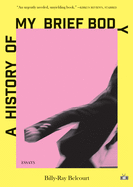
In A History of My Brief Body, Billy-Ray Belcourt, a member of the Driftpile Cree Nation, combines autobiographical vignettes with incisive analysis and decolonial theory, creating poetic meditations on how NDNs (Native Indians) can wield joy as a means of escaping a colonial world.
Belcourt (This Wound Is a World) begins by explaining how the "trauma of colonialism" is known to produce men who "self-destruct." Identifying as queer added another worrisome barrier to his future. Yet he didn't feel shame being with men. He felt savaged by "a History of the NDN as an Endangered Animal"--savaged by Canada, "still in the business of gunning down NDNs" and where homophobia and transphobia lurk, even on reserves.
Belcourt uses his personal history as one lens in a multifaceted indictment of the way Indigenous bodies are disavowed. He was dehumanized by a white man whose only partners have been NDN. Fearing he contracted an STI, he was denied care because his case wasn't extreme enough. A reviewer calls his poetry "simple," making him "shoulder the burden once more of voicelessness." Alongside his experiences, he cites thinkers like Foucault and José Esteban Muñoz to argue that to find utopia, queer NDNs especially must "desire to love at all costs." He defines this livability--this joy--as an "undefeatable excess," which inspires his poetry and seems imbued in his every sentence here, perhaps as his refusal to be distilled by the language of his oppressors. A History of My Brief Body is a breathtaking literary rebellion against the brutalization and simplification of NDN existence, establishing as resistance joy in creativity and its ability to invent worlds. --Samantha Zaboski, freelance editor and reviewer

